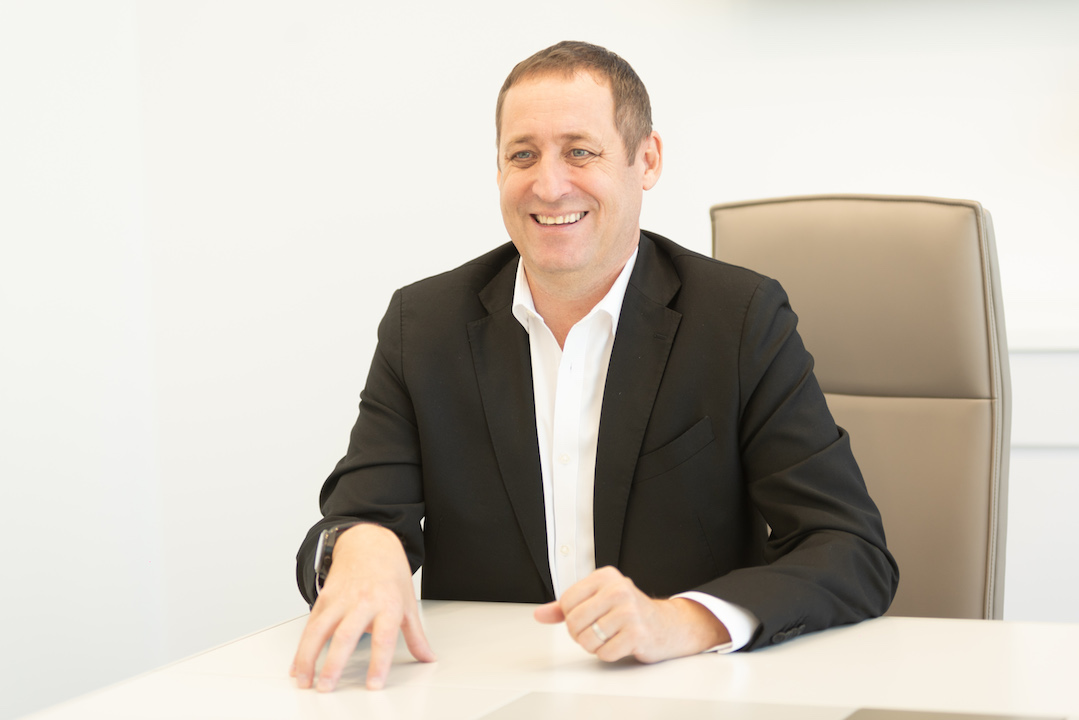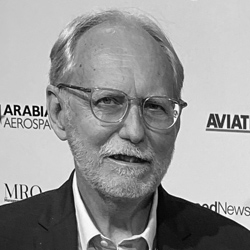Hangar management it's a key pillar to maintaining our growth
There’s enough MRO work out there for everyone, but not everyone is in a position yet to benefit. DAE Engineering’s Jeff Wilkinson takes a hard look at an industry in transition.

On the up: Growth for DAE Engineering's business in Jordan. Picture: Joramco
As Middle East aerospace news goes, a new hangar at Joramco’s Amman base was never going to compete with the Emirates and Flydubai announcements about building massive new MRO facilities at Dubai South, or even the fresh investment in Saudia Technic’s MRO Village.
That doesn’t bother Jeff Wilkinson. What matters to him, as Chief Executive Officer of DAE Engineering, the majority owner of Joramco, was the approach of the five customers immediately after the Joramco hangar’s Airbus A380 capability was revealed at the Dubai Airshow. “They were all asking for the A380 slot based on nothing more than hangar capacity,” he told Arabian Aerospace.
That reinforces his view that the independent MRO is not overly threatened by the “phenomenal” new developments in Dubai and Jeddah. In fact, the expansion that’s driving them “is music to our ears.”
As he sees it, as long as the OEMs are having trouble keeping up with deliveries, and growth opportunities within the airline markets, airlines will keep flying older aircraft, which need more maintenance.
Airline-affiliated MROs already have too much work to handle in-house; consider the new deal Joramco has just signed with Emirates covering nose-to-tail Boeing 777 maintenance services through the end of 2025, or the extension of its partnership with Gulf Air. The view from Wilkinson’s desk could hardly be better.
Senior executives over the world are fond of telling interviewers – often as an afterthought – that their company’s most important asset is its people. Some you suspect don’t mean it, but not Wilkinson.
Having the right people, and enough of them, remains one of the biggest competitive advantages – the “secret sauce” – of Joramco, the Amman-based MRO that he led until 2021 - and remains close to through his current role.
In a nutshell, Joramco does not suffer the “manpower drain” affecting the majority of MROs in an industry where the problem of finding enough qualified technicians to both support growth and replace the aging workforce – a storm gathering for many years – hit crisis proportions in the wake of Covid-19.
Says Wilkinson: “We see what’s going on in the UK and Europe. They’ve got great facilities but can’t get the manpower. It’s a similar story in Asia and South East in particular.”
Funnily enough at a recent industry event “I made an off-the-cuff comment recently: ‘If you’re not making money now in MRO, you’ve got a fundamental problem.’ If you can control your manpower, it’s ‘game on’.” – sadly not everyone has this luxury it appeared.
“The difference [at Joramco] is we’ve got an abundance of space, lots of (Joramco and other Technical colleges trained) local manpower, and the unhindered support of the local authorities and ministries to invest and grow. All of those make a winning formula.
Wilkinson moved into his present role in 2021, after four years at the helm of Joramco, to concentrate on the expansion of DAE Engineering, a division of Dubai Aerospace Enterprise. He had been head-hunted by DAE in 2017 to take over as chief executive of Joramco shortly after the group acquired its shareholding, and is credited with transforming the business by creating the strategy and overseeing the development that set the MRO on its path to becoming the leading independent aftermarket provider that it is today, doubling its man-hours but quadrupling its revenue over the last 6 years.
Leaving the day-to-day business to his successor, Fraser Currie, has allowed Wilkinson to focus on such areas as strategic opportunities, future customers, pricing and “what’s coming over the hill”. He confirms DAE is “still actively looking for the right expansion opportunities.” Opportunities abound, he says, but “these things don’t happen overnight.”
The airline-MRO relationship is a cycle, which at the moment is tilting toward airlines taking some maintenance in-house, mainly citing cost and control. Flydubai, for example, is reaching a tipping point where carrying out its own heavy maintenance makes sense to its owner. “We were a supplier for many years,” says Wilkinson. “Some of our engineers work for them. We wish them well.”
But he observes that for every MRO that tries to grow and diversify, another closes down. Global players are struggling even three years after the Covid meltdown. “I could reel off a list of companies where they have the hangar capacity but not the manpower, or they have manpower but are too expensive, or they have cash-flow problems due to seasonality.
“There will be more consolidation, more players falling out – our opportunity”.

It’s no secret that DAE Engineering is interested in growing its business outside Jordan, and receives “several” approaches a year from MROs hoping to replicate the Joramco success. The challenge is finding the right fit. Says Wilkinson: “DAE isn’t going to get involved in a company for the sake of ‘let’s go again’.
“We’ve identified a few possibilities. The issue at the moment is even MROs that are struggling are still putting a very high market value on what they think their worth”.
“We have to see if the company has potential. So far, none tick all the boxes.”
The right opportunity “will come, like Joramco, so slowly slowly”.
The Amman-based business is not short of opportunities to expand and keep its 17 bays – currently growing to 22 with potentially another five – filled, he said, with all Widebody slots sold out until the end of 2025. Asia is an obvious target for expansion.
“There’s a lot happening over there,” he said. Joramco counts Philippine Airlines and Cebu Pacific among new customers. A presence for the first time at MRO Asia Pacific last September served to raise the profile of Joramco and DAE Engineering and open conversations with other potential customers.
“No disrespect to the players that are down there,” said Wilkinson, “but several have got manpower constraints and are therefore having to use expatriate workforces to survive”.
“You might have technical excellence and ability, but if you don’t have the men, you can’t do anything. If you control your manpower, you control everything. That’s always been the point. [Training] is an investment.”
Joramco has always been fortunate in having a domestic workforce and the training facilities to create a pipeline of talent, mainly geared to its own needs. However, this pool of qualified technicians has not gone unnoticed by other MROs in the region with fewer domestic human resources.
Wilkinson has noticed a pattern of attrition in the ranks of technical staff that didn’t exist before the pandemic. “We have two or three companies now that actively target our staff. The good thing is they all have quotas. They’re not going to break a 1,000-employee organisation, but if someone takes eight or ten mechanics in one batch, it hurts us.”
Current pressure on MRO slots, and widespread outsourcing of heavy checks, are such that our own customers poaching engineers qualified on the relevant types would be counter-productive. “If a customer were to take staff from us, they’d only be damaging themselves.”
Construction has started at Queen Alia International Airport (QAIA) on the new $25-million hangar designed to handle Joramco’s venture into passenger-to-freighter (P2F) conversions as an authorised Boeing 737 conversion centre.
Conversions are “a good market and it will help us,” said Wilkinson. “It’s just another part of the jigsaw that eventually when aligned will serve us well.”
Amman, as he frequently reminds us, is “geographically perfect – three hours into Europe, three hours to cover the whole Middle East. Boeing wanted to bring [P2F conversion] close to the customer, and there you go.”
Making the new hangar A380-capable was a strategic decision: “The A380’s going nowhere anytime soon,” said Wilkinson.
“I'm not looking for the 12-year checks to come [to Joramco] – that’s specialist work that needs an airline MRO ideally. But there are things on an A380 – wing corrosion, spars, structural and Cabin modifications – that I would be very interested in.”
“I believe the time will come when somebody comes knocking on the door and says ‘I have an A380 and we need some structural work, please help.’ I would be devastated [to turn away business] to have saved $2 million (the price differential in the hangar height) on not building the capability for an A380 over the B777.
“We’re following the Dubai philosophy: ‘Build and they will come’”.
In summarising as Wilkinson looks back and into the future, “I’ve been in companies when I started out where there’s been downsizing, and I didn’t like it. Dubai Aerospace with their support and vision and Joramco with their relentless growth, this is the enjoyable environment.”
Stay up to date
Subscribe to the free Times Aerospace newsletter and receive the latest content every week. We'll never share your email address.


